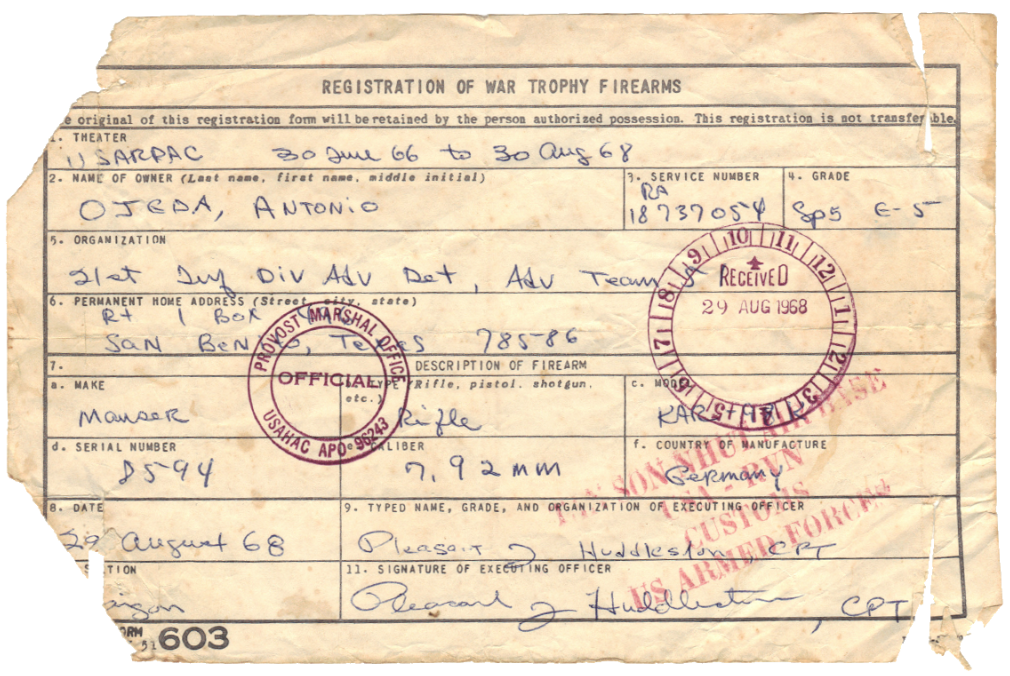
I was a sergeant of the guard with Advisory Team 51, 21st Vietnamese Infantry Division at Bac Lieu. I was subject to field deployment and had already been deployed to a five-man advisory team supporting one of several Vietnamese infantry battalions. This was not desirable duty since we were deployed far removed from the safety of the main advisory team. I carried the AN/PRC-77 backpack radio and pretty much became the advisor captain’s shadow. I followed him wherever he went since he needed ready access to the radio in case of enemy attacks requiring immediate artillery or aircraft fire support.
I knew enough about radio operations to know the enemy always looked for the radioman first. If he could knock out the radio operator, it was unlikely that any fire support would be called in. My radio backpack included a long antenna of about eight feet and a shorter whip antenna of about four feet which I found to be just as effective for radio communications as the longer one. I carried the longer antenna in the backpack for backup. The short whip antenna folded over made it more difficult to identify the radio operator from a distance.
I learned radio operations pretty much on the fly. My predecessor always carried a spare radio battery. I carried two spares. I also made a spare handset part of my load. I had learned previously that the handset was susceptible to failure once moisture entered the mouthpiece or earpiece. A failed handset would have been catastrophic if under attack and fire support was needed.
Life on this small team was a new experience for me. We would respond to operations within our assigned area of operations. The road marches were daunting and demoralizing. Vietnamese soldiers did not possess much military discipline. Instead of maintaining a five-meter distance, two or three of them would group together as we maneuvered down the road or open fields. Helicopter transport to designated coordinates were equally undisciplined as some would start trying to jump onto a different helicopter than assigned to be where their friends were.
I had been with that team about a week and was just adjusting to my new job when I received a radio message to catch the next helicopter back to the main team. My replacement had arrived, and I was free to return. Sanders, my replacement, was still in fresh fatigues, polished boots and a terrified look on his face as he jumped off the chopper. I had some ten minutes to brief him, assured him it was nothing terribly difficult then hopped on the flight taking me back to our main team.
It was during this deployment while traversing a canal that our Vietnamese point men noticed some large object partially buried along a bank of the canal where the water had receded. We formed a perimeter while the Vietnamese checked it for booby traps. When it was finally cleared, there were fifty-five gallon drums containing several weapons wrapped in oil cloth. The weapons were staged, and a helicopter was called in to transport the guns back to our Advisory Team 51 headquarters. Prior to the helicopter arriving, I tagged one of the guns with my name, serial number and team number. I never expected to see the weapon again; yet, a few weeks later, I was called to the Team's Military Intelligence office. Sitting in a corner against the wall was my souvenir German Mauser which I had tagged in the field location.
According to a historical document attached to the registration certificate, the Mauser originated in Germany and was was in an inventory of weapons taken by the Russians after WWII. There were several interesting observations included in the attached document. There were three different serial numbers in different parts of the weapon indicating the gun had been cannibalized from two other weapons to make it serviceable. The Russians transferred the inventory of weapons to the Chinese several years later. The Chinese then transferred the inventory to the North Vietnamese during the Vietnam war. The North Vietnamese transferred the inventory to the Viet Cong who sneaked them down to the Mekong Delta where we found them wrapped in oilcloth and hidden in fifty-five gallon drums on the banks of a canal. Military Intelligence surmised these weapons were to play a major part in a planned attack on our Advisory Team 51. We had denied them that opportunity.


My German Mauser KAR-98 war trophy.
I gave my Mauser war trophy to my kid brother. He held it for many years until a friend of his took interest in it and now owns it.
©Copyright texan@atudemi.com - January 2022